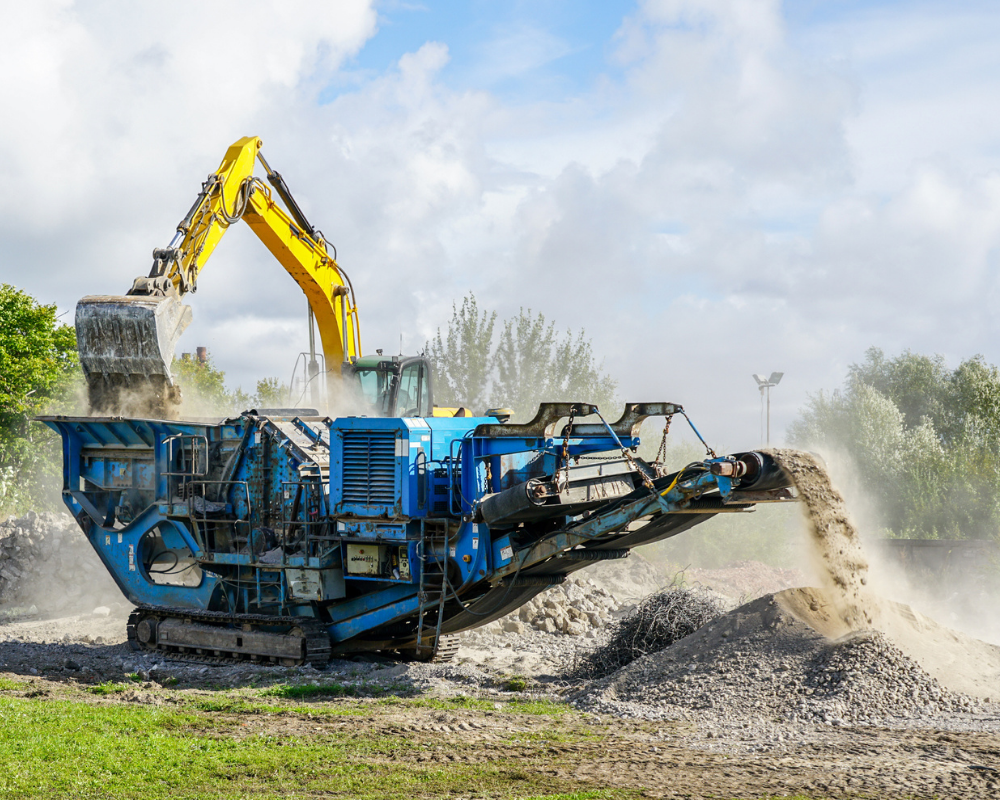
Contact Us
5 Hazelgrove Road,
Haywards Heath,
England, RH16 3PH
Get Connected
- [email protected]
- 01293 222 622

A government report (AM2023) recently dropped a statistic that should stop every UK construction professional in their tracks: in just two decades, permitted aggregate reserves have plummeted by 46%.
This isn’t a distant problem. With the UK consuming nearly 165 million tonnes of primary aggregates in 2023 alone, the Mineral Products Association is rightly warning that national housing and infrastructure targets are in jeopardy.
The industry’s instinct is to fight for what it knows: securing new primary supply. This is a totally necessary battle, but it’s only half the story. While we focus on unlocking future quarries, we’re overlooking a vast, immediately accessible reserve that’s already been dug.
The Strain of the National Shuffle
The challenge isn’t just about dwindling reserves; it’s also about logistics. The MPA’s data reveals a massive “national shuffle” of materials. Regions like the East Midlands are major producers, whilst others are heavily reliant on imports.
Consider this: the Southeast alone imports 8.8 million tonnes of crushed rock, with London bringing in another 5.2 million tonnes. This reliance on inter-regional flows puts immense strain on our road and rail networks, adds significant carbon emissions, and creates a fragile, expensive supply chain.
As Mark Russell, MPA Executive Director, puts it:
“Failure to respond to the findings of AM2023 would create a serious and costly risk not just to the minerals sector but also to the construction industry and the wider national economy… the Government has undoubtedly taken its finger off the pulse regarding the bread-and-butter minerals that the economy… relies upon.”
The Smartest Tonne is the One You Don’t Move Far
Let’s be crystal clear: the circular economy won’t replace the need for a healthy primary aggregates sector. We will always need both.
Recycled and secondary materials already account for an impressive 29% of our aggregate consumption – a figure the MPA notes is “close to the maximum achievable” with current methods.
But “current methods” are the key words. The next leap forward isn’t just about crushing more concrete; it’s about adding intelligence.
Every tonne of surplus material we intelligently identify, classify, and re-route to another project locally is a tonne that doesn’t need to be hauled from a quarry 150 miles away. It’s a direct cost saving, avoiding landfill tax and haulage. It’s a win for the environment. And critically, it’s a strategy that builds resilience by reducing our dependence on those strained inter-regional flows.
From Waste Liability to Digital Asset
For too long, surplus material has been a line item in the “waste management” budget. That era is over.
With platforms like our own, surplus becomes a digital asset. It’s time to get our heads out of the sand, and then use technology to find the nearest project that needs that sand.
The future of UK construction will be secured by two pillars: a supported primary materials industry and a world-class, digitally-enabled circular economy. The first is a long-term challenge. The second is something we can all start building today.
FAQs:
The UK faces a critical aggregate shortage because permitted reserves of materials like sand, gravel, and crushed rock have plummeted by 46% in two decades, according to the government’s AM2023 report. This dramatic decline, combined with a slow planning system for approving new quarries, puts the UK’s housing and infrastructure goals at serious risk. The problem is intensified by an inefficient supply chain that relies on transporting materials long distances across the country.
The circular economy helps by intelligently reusing the vast quantities of surplus materials (like soil and crushed concrete) generated on construction sites. Instead of being treated as waste and sent to landfill, these materials are identified, classified, and matched with nearby projects that need them. This directly reduces the demand for primary quarried aggregates, cuts carbon emissions from transport, and lowers project costs by avoiding landfill tax, creating a more resilient and efficient local supply chain.

5 Hazelgrove Road,
Haywards Heath,
England, RH16 3PH